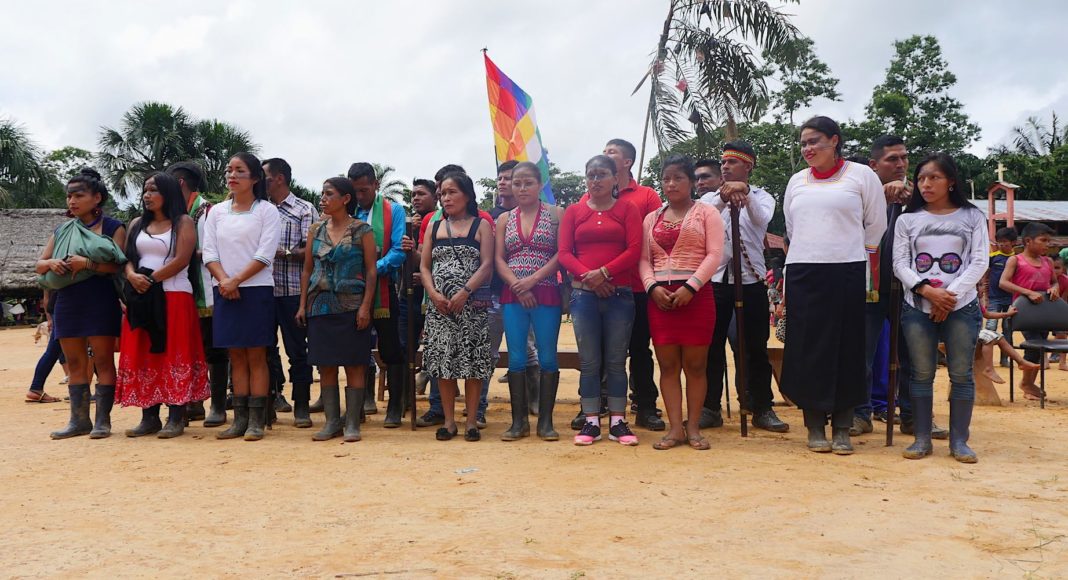The main concern of the government is to re-open the economy, and get the pipelines going again after lockdown, but they do not care about the wellbeing of our communities, who have no food, no water and no access to the cities to buy supplies.
Helena Gualinga
Ecuador, like its neighbour Brazil, has been hard hit by the coronavirus in terms of number of deaths in proportion to population. The two countries are also the home of Indigenous peoples who are among the communities most vulnerable to the virus – in the cities where they are often marginalised from the mainstream community; and in the Amazon, where they have few defences and little medical care on which to draw.
Those Indigenous communities living in voluntary isolation, who do not have immunity to any disease brought from outside, including COVID-19, are also at risk from loggers and gold miners, as well as from their occasional contact with members of other Indigenous communities who are engaged with modernity in a variety of ways, through commerce or tourism.
It is difficult to determine why Guayaquil, the commercial hub of the country, evolved into the epicentre of the pandemic in Ecuador, except that it is a hub for movement of peoples, within the country and to the outside. Ecuador has a large migrant population working in North America, especially New York, another COVID-19 epicentre; and in Europe, Ecuadorian migrants are concentrated in Spain and Italy, both countries heavily affected by the virus.
Within Ecuador, there is a relatively large and growing Indigenous population, which includes those Ecuadorian Amazonians who work in Guayaquil themselves as migrant labour, where they can earn cash to supplement communal livelihoods derived from subsistence agriculture and hunting. Amazonians also find work in mining and in the oil industry, which exposes them to the risk of coronavirus infection.
History is infected
When we returned to our communities, we experienced the effects of terrible flooding, due to climate change, something that had never happened on that scale before. Right now the Indigenous people are going through multiple crises, the environmental crisis, plus the effects of Covid-19 and also, as a result of all that, lack of food and other basic products.
Patricia Gualinga
Ecuadorian Indigenous people’s history is one of a constant inflow of viruses over 500 years, beginning in the sixteenth century, when up to 90 per cent of their population was wiped out by smallpox, typhus and influenza, carried by Spanish colonisers, as documented by historian Linda Newson 1)Newson, Linda A, ‘The Demographic Collapse of Native Peoples of the Americas, 1492–1650’ Proceedings of the British Academy 81, pp 247-288. With the appearance of the coronavirus, the movement of labour, forced or voluntary, has raised once more the spectre of annihilation for long beleaguered Indigenous groups clinging to their livelihoods and culture through a constant process of exodus.
The appearance of the virus compounds the threats they already face from the incursion of different aspects of modernity into their lives. Land appropriation, ethnic cleansing, ranching, logging, agribusiness, mining and oil extraction, have contributed to, if not driven, climate change. This in turn affects the ecosystems on which the Indigenous depend, and or which they form a part.
Instead of protecting the Indigenous people and preventing contamination in their ancestral lands, they allow miners from outside areas to go in and pollute their lands and potentially infect the native people.
Sônia Guajajara
In the first week of April 2020, the northern Amazon region of Ecuador experienced another major oil spill, on the Coca River, in Sucumbios province. ‘This was big, something like this has never happened,’ Juan Baez, Coca’s potable water director, said in a telephone interview with Reuter’s Holger Gallo. The president of the Panduyaku Indigenous group in Sucumbios province, said pollution in the river from the spill was clearly visible to members of his community.
Indigenous women take to the networks
In response to the Covid-19 crisis, and the risks it entails for Amazonian communities, Osprey Orielle Lake of the Women’s Earth and Climate Action Network, based in California, hosted two ‘Indigenous Women on the Frontlines’ webinars with Indigenous women speakers from North and South America. The second, ‘Amazonian Women on Pandemics & Defending the Amazon’, on 16 April was a zoom conference which over 17,000 people tuned into.
Sônia Guajajara
Sônia Guajajara, executive coordinator of the Association of Indigenous Peoples of Brazil (APIB), and vice-presidential candidate for the PSOL Party, expressed her dismay at the failure of the Bolsonaro administration to face up to the pandemic, which has cost more lives as a result of his dismissal of its severity. She commented that not only is the pandemic affecting Indigenous peoples in the Amazon, but it is affecting Indigenous people in Brazil who live in the cities. The true infection rate is unknown as a result of the lack of testing.
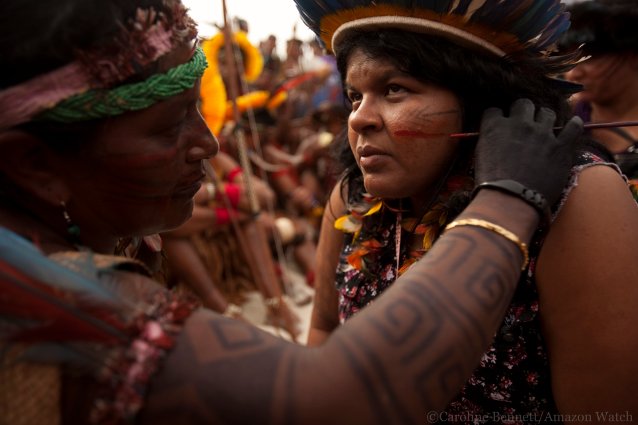
As a result of the virus, she explained, the deforestation of the Amazon rainforest had accelerated 30 per cent in April, and the government is encouraging expansion of mining as a way of compensating for the damage to the economy caused by the virus: ‘Instead of protecting the Indigenous people and preventing contamination in their ancestral lands, they allow miners from outside areas to go in and pollute their lands and potentially infect the native people.’
‘For us it is a great challenge,’ she said. ‘We need the international community to help us, because when they allow mining in the protected Indigenous lands, they are increasing the risk of contamination of Covid-19 to the local people by miners and contractors. This represents the danger of a new genocide for us.’
‘We need to learn something,’ she continued, ‘from the terrible period that we are living in. We need to learn that enough is enough, and to change our approach to the environmental crisis. It is time for people to look within themselves and reflect on the kind of society they want to live in from now on. We need to exercise our solidarity, to understand these extraordinary times as a warning from Mother Earth.
‘We need to stop and rethink our habits of waste and consumerism. We need to stop that and learn the values of living in harmony with our families, and with society. It is valuable to understand that one of the things we cannot do at the moment, because of the pandemic, is to hold each other, to touch our friends and family, which is a precious gift that we all miss.
‘It has never been so easy to understand that money can’t buy everything, that this terrible disease can affect us all — Black, White, Indigenous, yellow, rich or poor. It is time for us to gather together, to understand that only a collective movement can start to change the world order, to create a more just and equitable society. We have already faced so many different types of violence before, so we are now going to resist this new one together.’
Patricia Gualinga
Patricia Gualinga of the Sarayaku Kichwa explained that her people are suffering from severe flooding at the same time as the coronavirus:
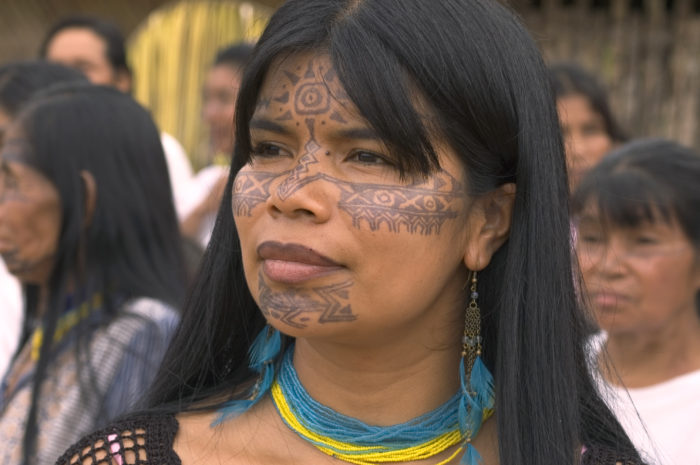
‘Mujeres Amazónicas staged a day of action in the capital, Quito, on 8 March, International Women’s Day, to raise awareness about our human rights and the rights to our ancestral territories.
‘When we returned to our communities, we experienced the effects of terrible flooding, due to climate change, something that had never happened on that scale before. Right now the Indigenous people are going through multiple crises, the environmental crisis, plus the effects of Covid-19 and also, as a result of all that, lack of food and other basic products.
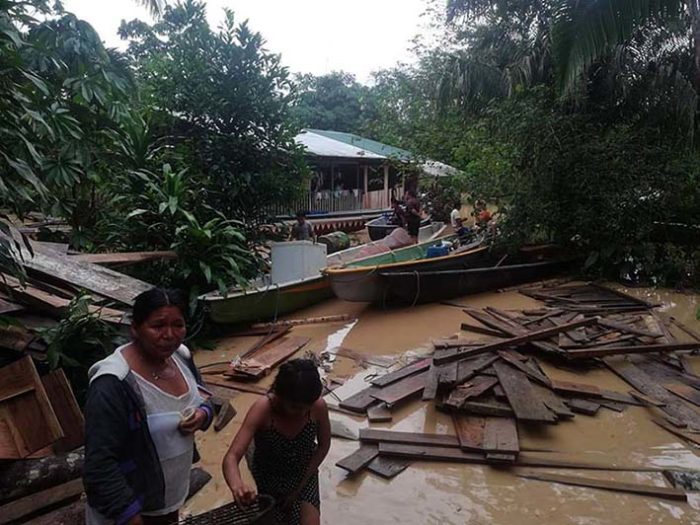
‘We also have a situation where many Indigenous people are stuck in the cities, due to the lockdown, and they cannot go back to their communities. I hope the governments understand that all these things are the consequences of actions that have taken place in the past…The terrible forest fires that we have seen in Brazil recently are a clear sign that our Mother Earth needs to rest.
‘Many years ago, my father used to say that if we keep destroying our Mother Earth, we are going to get sick, we are going to have epidemics and so on; at the time I did not understand, but I can see clearly now what he meant over twenty years ago. Right now I am stuck here in the city, because of the floods and the lockdown due to the pandemic, and I cannot go back to my community, though in a way I am glad I am here, because at least we are able to help the people who do not have access to their communities.
Helena Gualinga
‘Hi everyone, my name is Helena, I am 18 and I am Patricia’s niece, and I am from Sarayaku, a community in the Ecuadorean Amazon, which became well known due to our struggle against the oil companies, and we managed to kick them out a few years ago, despite them having the support of the government and the military. I grew up in that community, about five hours by canoe or 20 minutes by airplane from the city of Coca.
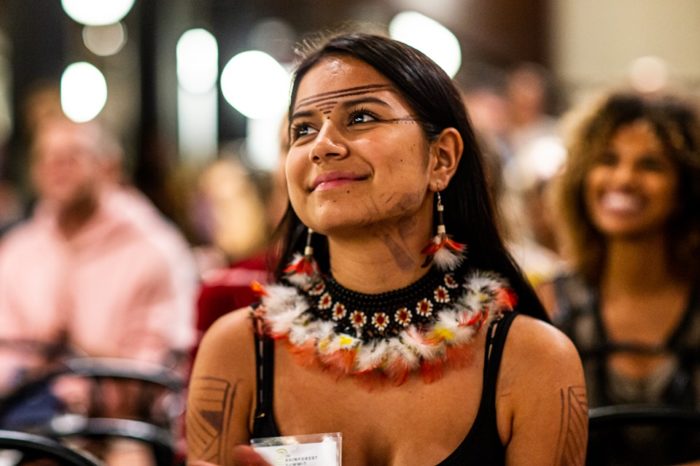
‘We did not have so many floods in the past, but the frequency has increased over the last 20 years. This year we have seen three floods happening in less than three weeks, destroying everything: houses, schools and also our crops, which means that we have no food security for at least one year. It is a lot harder to deal with this situation as the Covid-19 goes on; access to the communities is much more difficult, we are not able to send people back there to help them, so we had to get people from the communities to meet us at some accessible point half-way to receive food aid. This has been very difficult and frustrating.
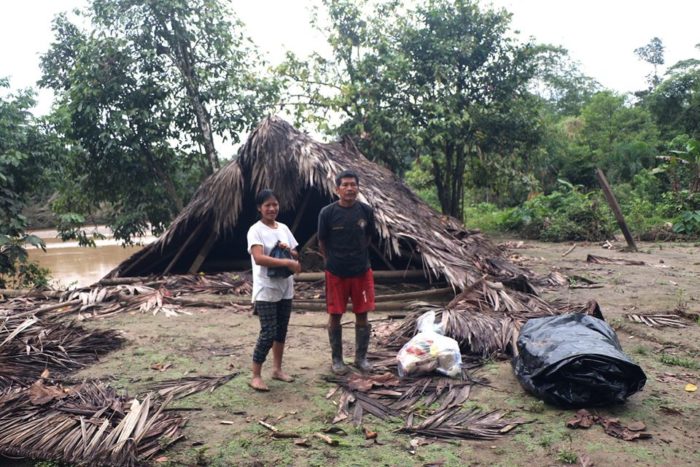
‘Before the pandemic and the floods we could be more self-sufficient, but since the pandemic, if someone in the household gets sick, they cannot go to the fields to work the land, so how are we going to be fed? The national government in Ecuador has no provisions for that kind of crisis for the Indigenous communities; they only make plans for the cities or for the majority non-Indigenous population and make no provision for us, the native population of this country.
‘We are not getting any medicines or emergency supplies of food. Other communities cannot even drink the water in their region because it is polluted, which means they cannot fish or drink from those waters. The main concern of the government is to re-open the economy, and get the pipelines going again after lockdown, but they do not care about the wellbeing of our communities, who have no food, no water and no access to the cities to buy supplies.
‘The river pollution is moving downriver and is expected to reach Peru, also affecting the Indigenous communities in our neighbouring country. And all of this is happening at the same time as the Covid-19 pandemic, so our people are being affected by multiple crises. ’The government is not providing us with any help at all on any of these major issues. We also know that we are not the only ones facing these; it is happening all over the world. And as a young person experiencing this, we realize that this could be the new normal for us in the future; something that we could be facing every week, every month for us and for our children. It’s a very scary situation, to realize that something we were so scared of it is actually happening now.
Main image: from Patricia Gualinga’s Facebook page, 2018
References
| ↑1 | Newson, Linda A, ‘The Demographic Collapse of Native Peoples of the Americas, 1492–1650’ Proceedings of the British Academy 81, pp 247-288 |
|---|

